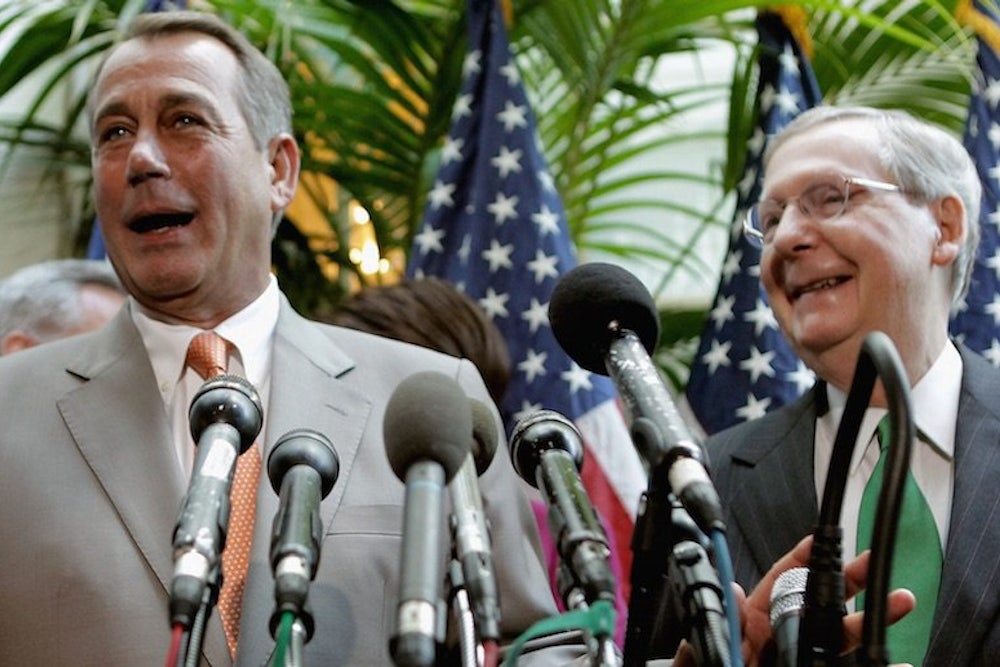I generally don’t go in for sentimental holiday rituals like announcing New Year's resolutions or giving children candy on Halloween. But in the interest of promoting counterintuitive thinking about American politics and juicing this website’s holiday traffic, I’m making an exception this Thanksgiving. So here goes:
Today, I am thankful that Republicans won the midterm elections and will soon control the U.S. Senate.
I'm not arguing that a fully Republican Congress will produce better policy than a divided Congress, or that Democrats should feel relieved to have lost the midterms so badly. All I’m suggesting is that a Republican Senate is the best outcome for me, personally, and for the growth interests of my employer. And also, maybe—in the longer term—for the country’s fragile, wheezing political system.
1. A Split Congress Had Become Pretty Boring
For the past four years, Republicans have controlled the House, and Democrats have controlled the Senate. In the beginning—and until quite recently—this was a recipe for a thrilling, pyrotechnic variety of dysfunction. In 2011 Republicans nearly shut down the government, and brought the nation to within hours of a default on the national debt. 2012 was pretty boring, as political combat played out on the campaign trail rather than in the Capitol, but by 2013, Republicans were back at it and in October they came full circle and finally did, in fact, shut down the government.
That episode stiffened the spines of Republican leaders, who became determined to avoid a repeat. 2014 passed without incident. Had Democrats held on to the Senate by a thread, the pattern of the past four years probably wouldn’t have repeated itself.
2. Republicans Are Drunk With Power and Wildly Irresponsible
Republicans won the election overwhelmingly and the party’s rank and file are itching to assert themselves, but the party still lacks a constructive channel through which to exercise its power. That augurs for a series of confrontations between Congress and President Obama over things like annual spending levels, environmental regulation, and the Affordable Care Act. But Republicans have since been further provoked by Obama’s decision to shield several million low-priority immigrants from deportation. Now Republicans are scrambling for a response and considering everything from refusing to confirm most of Obama's nominees to denying Obama access to the Capitol for his State of the Union Address to shutting down the government. Everything, essentialy, except impeachment, and they may come around to that idea yet.
If Democrats had managed to reclaim the Senate, Obama’s deportation policy wouldn’t amount to such a big affront to Republicans, and their behavior would be more subdued. The new Congress thus promises to be more exciting.
3. A Republican Congress Will Be Great for Web Traffic
See items one and two.
4. The Political System Needed a Shakeup
Part of the reason things in Congress got so boring this past year is that the existing partisan arrangement in Washington had exhausted its potential. Like a chemical reaction that begins explosively but eventually fizzles out, Republicans came to terms with their relative powerlessness, and became complacent passing petty legislation and blocking the Democratic agenda, without committing any unforced errors. Democrats grew satisfied running the party’s agenda through the Senate and trying to drive a wedge through the GOP, while protecting Obama from any real controversy. This fostered intellectual and partisan sclerosis, which would have hardened further if the balance of power hadn’t shifted somehow.
5. Republicans Asked for It
If you believe, as I do, that the most important story in U.S. politics right now is what’s happening to the Republican Party, you should be grateful that they now command more of the spotlight. Maybe you’d be happier with a permanent Republican minority, but that’s not what they are, and as long as they’re going to exert control over the political system, better that they do it out in the open than behind the cover of a Democratic Senate. They may not have to “govern” or “cut deals” to make it through the next two years, but they need to deal with each other. This means figuring out whether and how to pass a budget, framing the debate for the Republican primary, and resolving inevitable tension between their celebrity senators who want to be president and the congressional leadership. These conflicts will reveal a great deal about the party even if it manages to avoid descending into chaos or striking a single deal with Obama.
6. Democrats Needed It
If you also believe, as I do, that the second most important story in U.S. politics right now is the Democratic Party’s post-Obama identity crisis, it’s worth considering the possibility that the party will have an easier time sorting that out if it isn’t wasting a bunch of resources half-controlling a gridlocked Congress. Obama’s agenda is mostly tapped out. The party’s broader agenda is pretty stale. Hillary Clinton doesn’t have an agenda.
It’s plausible that Democrats can hold on to the presidency even without addressing any of these problems—that they can win by virtue of not being Republicans. But that’s not a recipe for inspiring anyone, and it’s definitely not a recipe for making the country better. If Democrats still controlled the Senate, they would consume themselves with minutae, fearful of stepping on Clinton’s toes, and would never challenge her to do anything bold. Relinquishing that control means they can’t set the agenda for her. That’s unfortunate for her—and the GOP’s big victory in November increases the stakes of her candidacy considerably. But I think there’s a real chance that the Republican sweep will create the incentive for her, and the party infrastructure, to offer up something interesting, rather than cede the policy conversation to the GOP or rest on her laurels.
